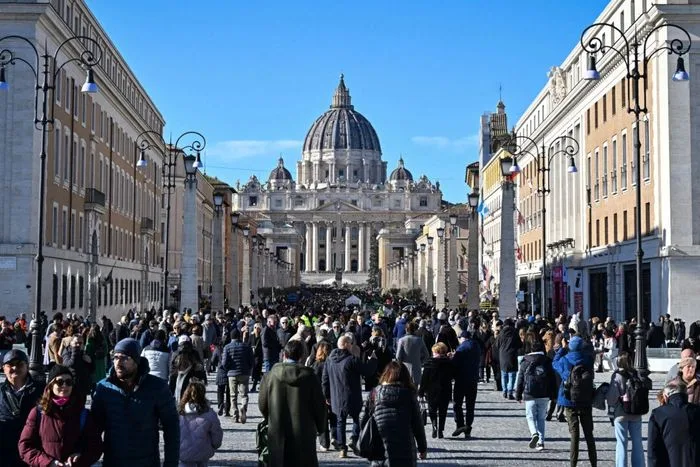By Naveen Athrappully
An Italian scam operation that duped travelers of more than half a million dollars was dismantled in a joint operation between the U.S. Secret Service and Italy’s national police force, the Polizia di Stato, the former said in an Aug. 13 statement.
The law enforcement agencies teamed up earlier this year to dismantle a scheme that targeted people booking vacation rentals in Rome via popular travel websites.
Malicious actors advertised five-star listings to tourists from the United States and other nations. Interested tourists were convinced by the fraudsters to make direct credit card payments, rather than payments through secure websites, according to the Secret Service.
“The victims paid a deposit over the phone and provided the security code on the back of the card. In return, they received fake confirmation numbers,” the agency stated. “When the victims arrived, they quickly learned the lodging never existed.”
Jeffrey Rinehart, special agent in charge of the Secret Service’s Rome Field Office, said many of the victims had saved money for their entire lives to make the trip.
According to the Secret Service, the scheme, which ran between April and October 2021, resulted in the theft of 600,000 euros (about $700,000), duping more than 200 Americans in the process.
Perpetrators of the scheme spent part of the stolen money on luxury hotels in Rome. More than 93,000 euros (about $109,000) was spent at expensive hotels.
Authorities arrested 20 people related to the scheme in March, and a court in Italy charged them with cyberfraud, misuse of credit cards, identity theft, and aggravated fraud. However, the mastermind has fled to Brazil, according to the Secret Service.
“It is really important to investigate and prosecute cases like this because e-commerce nowadays is really worldwide. There are no borders anymore,” Rinehart said.
“It’s important for Americans and people back home to feel confident when they are doing e-commerce online or using the internet. If we aren’t out here catching the criminals that use those systems or exploit those systems, that would just get out of control.”
Safety in Europe
Italy welcomed more than 133 million tourists in 2023, and Americans accounted for the second-highest visitor count, at 11.1 percent.
According to a May 23, 2025, update, the State Department has classified Italy with a “Level 2—Exercise increased caution” designation, warning about the risk of terror attacks.
Other major European countries, such as France, Spain, Germany, the UK, and the Netherlands, also have a Level 2 designation. Greece, another popular destination for American tourists, has the designation “Level 1: Exercise Normal Precautions.”
Travel scams dupe many Americans every year; one in five are estimated to have experienced fraud while booking trips, according to a June 26 report by cybersecurity company McAfee.
Among the individuals who got scammed, 5 percent lost more than $1,000.
In addition, nearly 8 percent of Americans have entered their payment details on a fake website, the McAfee statement said, and 4 percent have been duped into booking trips or accommodation that never existed.
Younger people were identified as having been victimized at higher rates. Among 18- to 24-year-olds, 21 percent clicked on fake confirmation links, and among 25- to 34-year-olds, 10 percent were misled by artificial intelligence-generated travel images.
“With a significant number of people surveyed falling victim to travel scams, it’s clear that staying vigilant is more important than ever,” Abhishek Karnik, head of threat research for McAfee, said.
“Scams are becoming harder to spot, from fake booking confirmations to AI-manipulated photos. Taking just a few extra seconds to verify a deal or website can be the difference between a great trip and a costly mistake.”
According to a May 2025 report from Mastercard Economics Institute, destinations that attract large crowds are prime targets of fraudsters, given the high concentration of visitors and relatively high volume of transactions.
Cities with the lowest reported travel-related fraud rates were San Francisco; Seoul, South Korea; Edinburgh, Scotland; Dublin; and Budapest, Hungary, the report said.
Hanoi, Vietnam; Dhaka, Bangladesh; Bangkok; and Cancún, Mexico, reported higher fraud rates, it added.
“Travelers are at risk of fraud well before they leave home. An analysis of Mastercard’s aggregated and anonymized transaction data reveals that in 2024, the fraud rate in sectors associated with the early stages of trip planning increased more than 12 percent compared to the previous year,” the report stated.
“Travelers commonly encounter manipulated destination photos, fake confirmation links, and false offers, with fraudsters preying on the desire for discounted travel amid inflation and economic pressures.”
In a May 2024 report, McAfee advised people to be wary of phishing emails and texts received before travel, as these are common tactics deployed by cybercriminals to trick eager travelers into revealing sensitive info or downloading malware.
Messages appearing to come from hotels, airlines, or financial institutions that ask for personal details or encourage clicking suspicious links should be handled with increased caution, the security company said.






